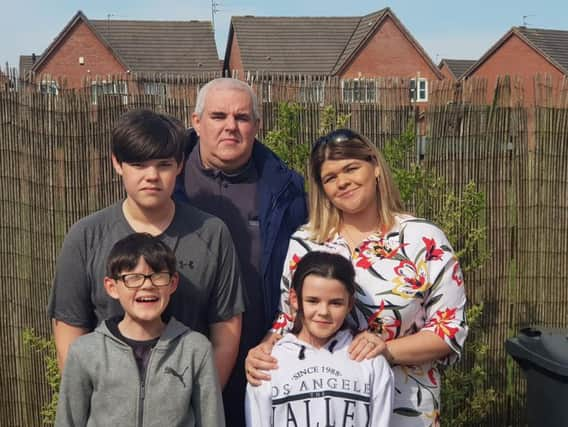Dad who has three children with epilepsy calls for families to take part in a research project at Edge Hill University


Having taken part in many research schemes across the country, Stephen is taking part in Edge Hill University’s CASTLE (Changing Agendas on Sleep, Treatment and Learning in Epilepsy) trial.
Families have been central to the research programme in guiding the best ways to measure health and quality of life for children.
Advertisement
Hide AdAdvertisement
Hide AdStephen and his wife Alisa volunteered to be a part of the panel as their 14-year-old son, Matthew and ten-year-old twins, Charlotte and James, all suffer from epilepsy.He said: “My wife and children are involved in the trial in a big way, as we have shaped and amended the questions the trial will ask parents. We are here to try to help get as much information as possible. We want to help other families who are going through having a child with epilepsy, as it is not a nice experience. We have taken part in a few trials, as there are not many families with three children who have epilepsy.
“It affects my children quite a lot, in the fact they have anxiety and it affects their sleep, so they are often drowsy. It also affects their schoolwork. Matthew is getting better and hopefully he will grow out of it in the next year or so. But all three have a lot of fits, mainly at night. They have between two and three a week and sometimes they get them in clusters.“We have to have a stringent routine with them to make sure they get enough sleep, as otherwise, it can trigger a seizure.“We have to make sure the twins get to bed for 9pm, so they get enough sleep. The seizures are random and there is no warning so we have to put things in place to minimise them happening. Medication does help, but does not get rid of it totally.”
Researchers are aiming to enrol 300 children with rolandic epilepsy, the most common form of childhood epilepsy. The CASTLE research programme, which is led by King’s College London and the Evelina London Children’s Hospital, focuses the wider aspects of living with rolandic epilepsy that are of importance to families, such as children’s learning, sleep, behaviour, self-esteem and mood.
Seizures usually happen at night and affect children between the ages of five and 12 before tapering off in adolescence. Most treatments to reduce seizures involves drugs, but they can often slow down a child’s thinking and learning and because children with rolandic epilepsy ‘grow out’ of their seizures, doctors often don’t know whether to treat children or not.
The trial will compare the effects of two licensed drugs.
Advertisement
Hide AdAdvertisement
Hide AdNICE guidelines recommend the standard epileptic drug carbamazepine which prevents seizures but can have negative impacts on learning. A newer drug called levetiracetam might be just as effective but without impacts on learning but has not been evaluated in a rigorous clinical trial for rolandic epilepsy.A second key aim of the CASTLE trial is testing whether improving sleep can reduce seizures.
The researchers have developed the world’s first online sleep behaviour intervention especially for epilepsy, which teaches parents how to encourage good sleep in their children. The trial will test how well the sleep intervention works both with and without medication for seizures.
Edge Hill’s Bernie Carter, Professor of Children’s Nursing, said: “Within this national trial, we will be interviewing children and their parents about their experiences of rolandic epilepsy, sleep problems and issues relating to taking medication. These interviews will help us understand more about how children and their parents think the treatments and interventions work and find out what, if any, problems they have had to deal with. Without understanding how treatments and interventions work in the real world, we can’t know if they will be properly effective.”
Professor Paul Gringras from Evelina London Children’s Hospital, and co-leader of the trial, said: “There is a vicious cycle whereby seizures and medications can affect sleep, but broken or insufficient sleep can also increase likelihood of seizures. This sleep disruption has huge impact on whole families, with mothers of children with epilepsy rarely getting more than four hours a night. We are asking a simple but vital question – can improving a child’s sleep reduce their seizures and improve their and their parents’ well-being?”The trial is funded by £2.3m from the National Institute of Health Research and brings together expertise from UK research institutions, including the University of Liverpool, Edge Hill University, the University of Exeter, Oxford Brookes University and Bangor University. Families interested in taking part are encouraged to speak to their paediatrician or epilepsy nurse.
More details on taking part are available online: www.castlestudy.org.uk/take-part/